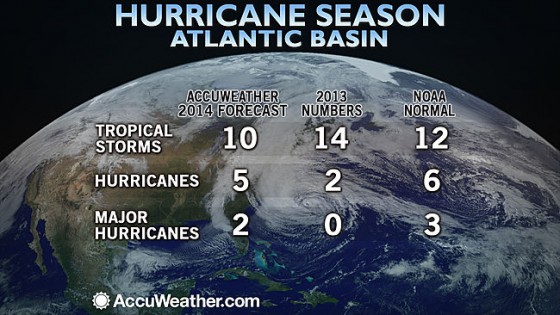With less than two weeks weeks until the official start of the Atlantic hurricane season on June 1, organizations and homeowners alike are hoping that this year’s season mirrors that of 2013, which was one of the quietest in 30 years. So far, most experts are predicting another relatively calm year.
Philip Klotzbach and William Gray from Colorado State University’s Tropical Meteorology Project predicted below-average hurricane activity, with nine named stroms, three of which would be hurricance and only 1 would be a major hurricane (Category 3 or higher). According to their research, there is only a 35% chance of a major hurricane making landfall in the United States. the average for the last century has been 52%.
Accuweather.com predicted similar numbers with 10 named storms, 4 hurricanes and 2 major hurricanes. these number are all below normal levels as established by the National Oceanic and Atmospheric Administration (NOAA).
 Of course, as Klotzbach and Gray point out, it only takes one hurricane making landfall to make it an active season for coastal residents.That means preparedness it vitally important. The Insurance Institute for Business & Home Safety (IBHS) recommends that property owners in at-risk regions focus on five areas to protect their property:
Of course, as Klotzbach and Gray point out, it only takes one hurricane making landfall to make it an active season for coastal residents.That means preparedness it vitally important. The Insurance Institute for Business & Home Safety (IBHS) recommends that property owners in at-risk regions focus on five areas to protect their property:
- Prepare your surroundings to reduce damage from wind-borne debris.
- Protect building openings.
- Strengthen roofs.
- Ensure the building is tied together (meaning that the roof is secured to the walls and the walls to the foundation).
- Properly elevate the building.
Business owners should also remember that sometimes risks can come from some unexpected places. In an article by Caroline McDonald in Risk Management, she spoke to Ron Hayes, who now works as a public entity commercial producer at Arthur J. Gallagher Risk Management Services. He was previously school board risk manager for the Calcasieu Parish, in Lake Charles, La., where he weathered Hurricane Katrina in August 2005 and, a month later, Rita:
When law enforcement returned to police the community and prevent looting after Hurricane Rita, for example, they had 500 flat tires in the first week from running over nails and debris. “You don’t think about things like that until it happens,” he said. “Until you have the tire store up and running, what are you going to do?” The department has since made arrangements to access tires whenever needed. “Pre-storm planning is so important for post-storm recovery,” Hayes said.
The lesson, as always, is that being prepared is always a good thing. As the saying goes, it’s better to have and not need, than to need and not have.
